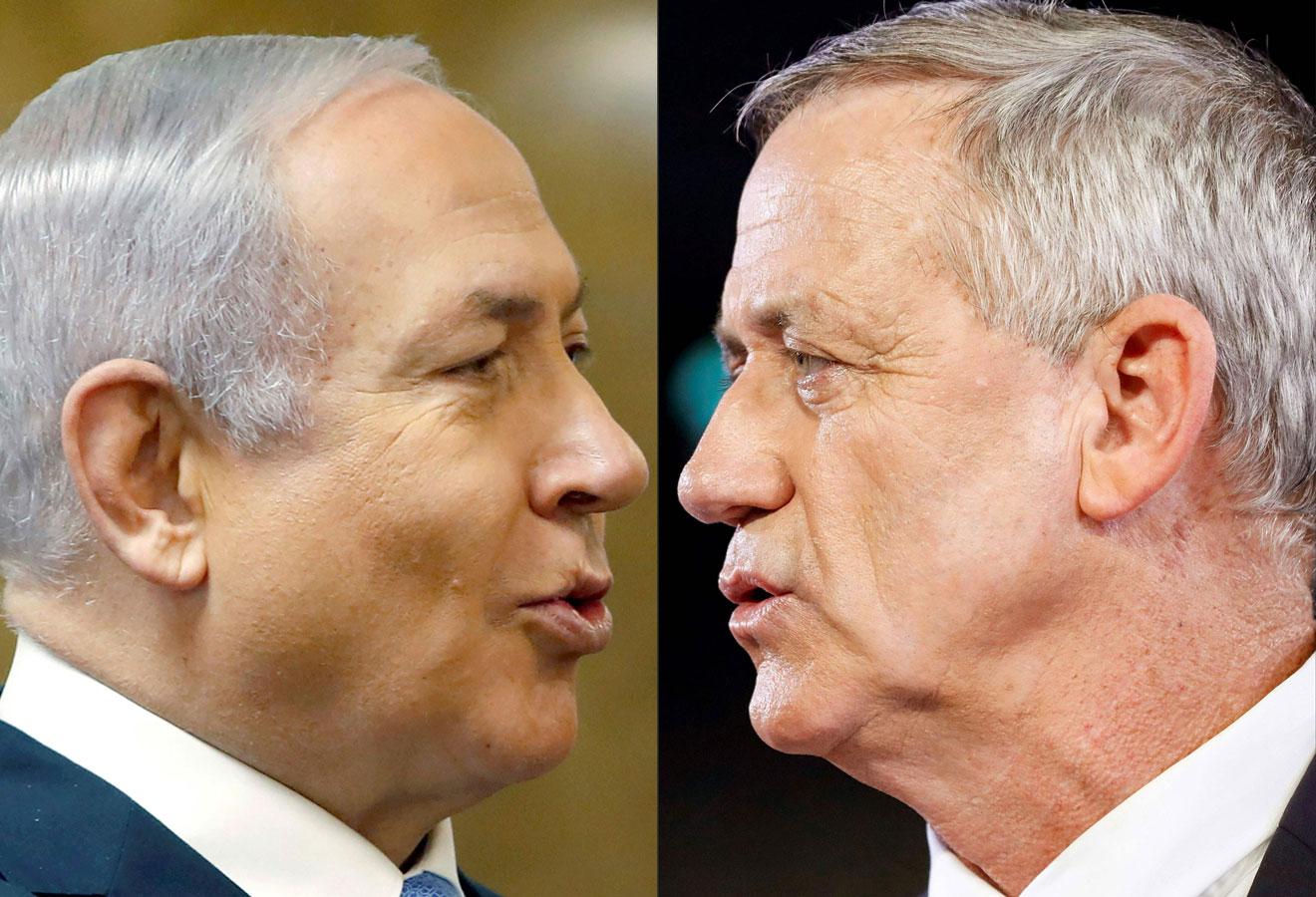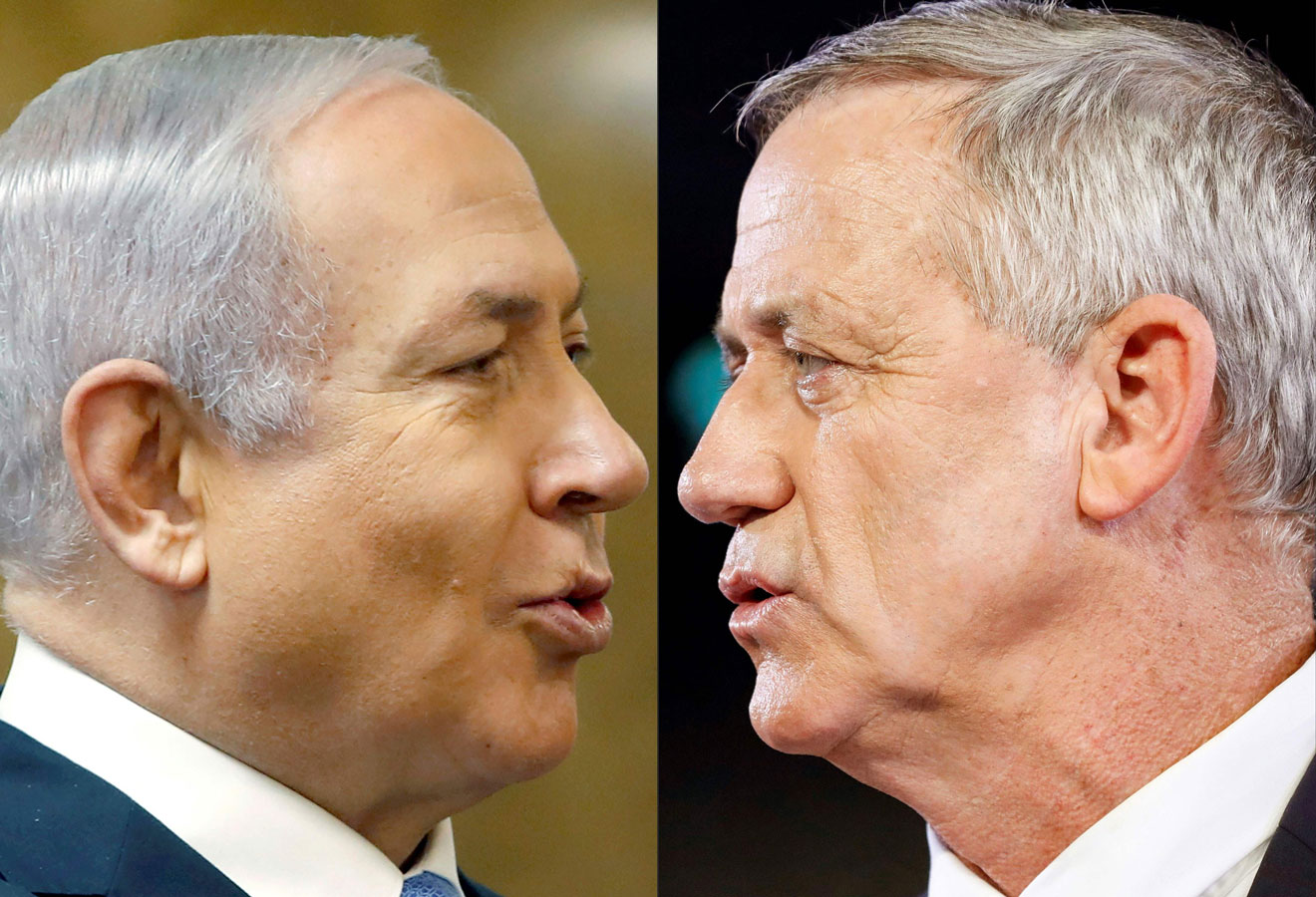Israelis head to second elections in a year
LONDON - Opinion polls predicted a close race when Israelis go to the polls September 17, five months after an inconclusive vote in which Israeli Prime Minister Binyamin Netanyahu declared himself the winner but failed to put together a coalition government.
“A Likud victory is possible but it’s hanging by a thread,” Abraham Diskin, political science professor at Jerusalem’s Hebrew University, told Reuters, referring to Netanyahu’s right-wing party.
An end to the Netanyahu era after 10 years in power, however, would not likely lead to a dramatic change in Israel’s policies on hotly disputed issues in a peace process with the Palestinians. Relations with the United States would be likely to remain on track, despite Netanyahu’s close relationship with US President Donald Trump.
Likud is running neck and neck with the centrist Blue and White alliance led by former armed forces chief Benny Gantz, who has focused heavily on corruption charges Netanyahu faces.
Gantz said his party would not join a government with Netanyahu in it, citing the prime minister’s legal troubles. If a partnership with Gantz is the only way to stay out of the back benches, prominent Likud members could try to topple Netanyahu as party leader, some political analysts said.
Netanyahu’s political fate could end up in the hands of the far-right Yisrael Beitenu headed by former Defence Minister Avigdor Lieberman in the coalition-building certain to follow the vote.
After the election in April, Lieberman blocked Netanyahu’s attempts to form a coalition, citing differences with the prime minister’s ultra-Orthodox allies. Opinion polls indicate Yisrael Beitenu will emerge stronger in the new ballot.
“(Lieberman) has an ability to crown the next prime minister and he knows it very well,” Dmitri Doubov, editor-in-chief of Israel’s Russian-language Channel 9 television, told Reuters. “I don’t think that he sees himself as the next prime minister but he can set the conditions for the next coalition to define it as he wants, as he sees fit.”
In a step that alarmed Palestinian and other Arab leaders but delighted his core right-wing constituency, Netanyahu announced his intention to annex the Jordan Valley in the occupied West Bank.
It was, Israeli political commentators said, an attempt to draw votes from far-right parties. Netanyahu’s annexation remarks weren’t challenged by Gantz. In fact, his party claimed ownership of it.
“Blue and White has made clear that the Jordan Valley is part of Israel forever. Netanyahu drafted a plan to cede the Jordan Valley in 2014,” the party said in a statement. “We are happy that the prime minister has come around to adopt the Blue and White plan to recognise the Jordan Valley.”
Blue and White also said it would “strengthen the settlement blocks” in the occupied West Bank, which are illegal under international law.
“Both (Netanyahu and Gantz) are basically saying there will not be an independent Palestinian state,” Avner Gvaryahu, CEO of Breaking the Silence, a group of former Israeli soldiers that advocates for an end to the occupation, told Time magazine.
Gantz was chief-of-staff from 2011-15, when he retired, and has boasted in video clips of the number of Palestinian militants killed and targets destroyed under his command in the 2014 war in Gaza.
Netanyahu and Gantz are seen to be in step on external threats, such as archfoe Iran and Lebanon’s Hezbollah as well as Hamas. Gantz, however, does appear more open than Netanyahu to resuming peace talks with the Palestinians.
Some candidates of the centrist Blue and White alliance are seeking votes from the Arab minority who make up nearly one-fifth of Israel’s population. They are descendants of Palestinians who remained on their land after Israel’s creation in 1948 and they largely support the Palestinian cause.
In Israel, voting largely follows ethnic lines, with Arabs voting for Arab candidates and Jews supporting Zionist parties but in this election, some are said to be considering crossing traditional community lines.
Netanyahu has been repeatedly accused of demonising Arab Israelis during campaigns.
Blue and White candidates often attack Netanyahu or promise more development funding for Arab communities in Israel, while staying off the subject of the Israeli-Palestinian conflict and the Israeli occupation of Palestinian territory.
The country’s main Arab parties have again formed an alliance in hopes of repeating or beating their performance in 2015 elections, which saw them become the third-largest force in parliament. However, they must tackle low turnout figures, such as those registered in April, when their parties were divided.
Ahmad Tibi, a prominent Arab Joint List member, told Agence France-Presse (AFP) that polls indicate that the main reason Arabs, who make up some 960,000 eligible voters, abstain is a lack of confidence in parliament, with party divisions accounting for only 9%.
The Blue and White alliance is seeking votes from Israel’s 140,000 Druze community. Many Druze voted for Netanyahu’s Likud in recent years but the majority opted for Gantz in April, said Yusri Khaizran, a specialist in Middle Eastern history at Jerusalem’s Hebrew University.
He said the vote will be similar this time. “It’s mainly because of the feeling of frustration of the Druze, who feel betrayed by the nation-state law,” Khaizran told AFP.


